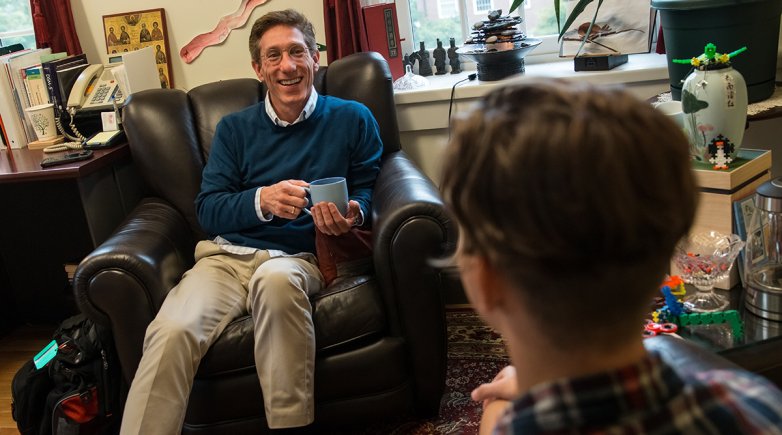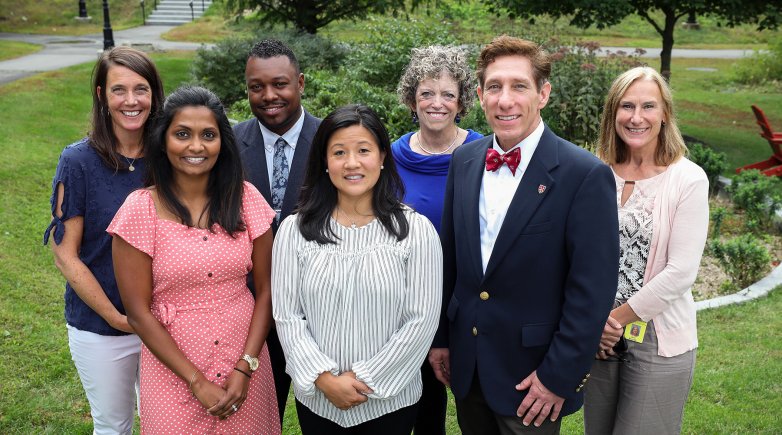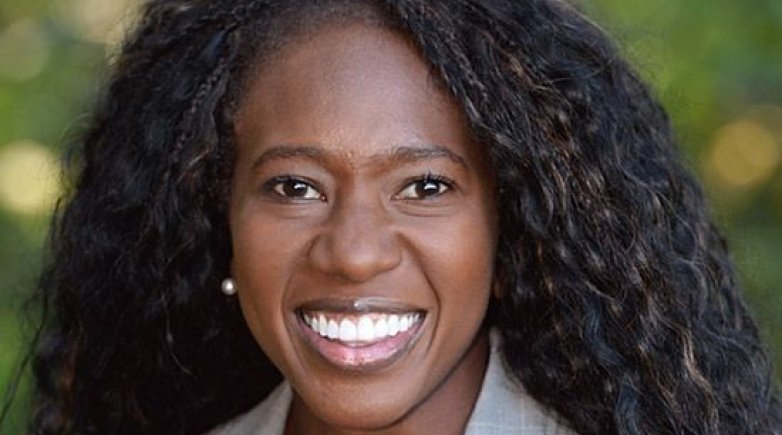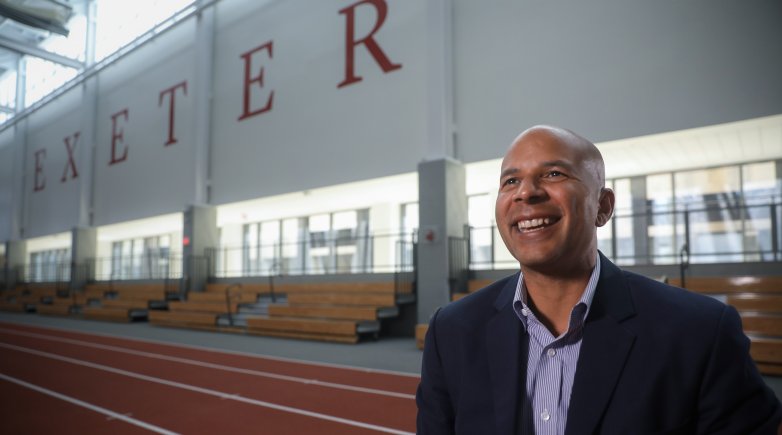A conversation with psychologist Chris Thurber
Exeter counselor discusses his latest book and a positive approach to parental pressure.
What does an affirming, supportive, healthy conversation between a parent and child look like? How about under these tricky situations: when your child finds out the object of their affection is taking someone else to the prom; or when they receive lower-than-expected grades; or even when the kitchen garbage hasn’t been taken out yet again?
In his latest book, The Unlikely Art of Parental Pressure: A Positive Approach to Pushing Your Child to Be Their Best Self, Exeter’s Associate Director of Counseling and Psychological Services Christopher Thurber offers myriad practical examples of how to chat with your child in a manner that’s both direct and empathetic, and reveals “Four Interrogation Methods to Avoid,” such as expecting the best rather than their best.
Thurber is well versed and expertly trained to offer such insightful advice. He has served as a staff psychologist at Exeter since 1999, and earned his bachelor’s degree from Harvard and his Ph.D. in clinical psychology from UCLA. His doctoral graduate work on homesickness and summer camp generated 2015’s Summer Camp Handbook and led to multiple public appearances.
Co-written with fellow psychologist and emotional-intelligence expert Hendrie Weisinger, The Unlikely Art of Parental Pressure shines a potent spotlight on the vagaries of parental pressure and how to morph unhealthy pressure into the healthy variety. As Thurber says, an ever-present element of warmth is key to successful adult-kid interactions. Warmth is a characteristic that Thurber also emulates successfully in his writing, making this book a particular pleasure to read.
With so many parenting books out there, what makes this one stand apart?
This is the first discussion of parental pressure that shifts the narrative from how much to what kind of pressure. Specifically, the instinctive nature of parental pressure means no one can tell parents to “stop pressuring” their kids. Well, they can say that, but nothing will happen. We provide lots of realistic examples to guide parents and other caregivers to transform what they might identify as harmful pressure into healthy pressure. [Second,] we’re addressing a circumscribed topic — the pressure that caregivers apply — but we include pressure from other adult caregivers, from coaches and clergy to teachers and mentors. And the third notable difference is a challenge to society at large to improve the college admissions process.
So much of parental pressure does seem to come from a desire to get kids into a good college so they can succeed in life.
One of the most frequently quoted passages from the book is where we write, “…prestige carries weight in some circles, but it never carries the day. How did pride in our kids become more about which school’s name is on the diploma than which student’s name is on the diploma?” My co-author, Hank, and I both worry about the unhealthy pressure that is part of today’s college process. I said to Hank, “I don’t want to pick on college and university admission committees, but if we could identify one place where the culture could change and produce better mental health and a better view of what success means, this would be the starting place.” Hank agreed. So throughout the book we say to parents, “Here are places where you can change the type of pressure you apply during the college process.” Then, in the Epilogue, we discuss our collective responsibility to improve the college admissions process through a cultural shift. We think it’s doable, especially in this period of rapid, pandemic-induced changes to the college admissions process.
I appreciate the distinction you make in the book, that the best parental guidance isn’t about direction or advice or structure, it’s about a better way to present that guidance to young people — to engage with them and to engage them with it.
That’s a big point that Hank and I make in the book: changing from harmful to healthy pressure doesn’t mean lowering standards and saying, “Oh well, we’ll stop putting so much pressure on you.” It’s how to stop thinking about pressure in a quantitative way — “Should I use more or less pressure?” — and start to think about it in a stylistic way: “How am I applying the pressure?” Parents love their kids, so they’ll naturally state expectations and apply pressure to fuel progress toward those goals. But it’s futile if that pressure is of the harmful sort. The beauty is that when parents learn the distinctions between harmful and healthy pressure, they realize that they don’t need to lower their standards one bit. They simply become more effective caregivers.
How did you decide to collaborate with your co-author?
Hank contacted me out of the blue. He had written a book on pressure management and found my online courses for camp counselors. He asked whether he could host a module on pressure for camp counselors. I said, “Well, they experience some healthy pressure, but happily it’s a break for a lot of them from the unhealthy pressure that they experience elsewhere … with competitive admissions and what recent alums tell me they’re experiencing in college.” He called me about a week later and said, “OK, so we need to write a book together.” And I thought, “I just met this guy over the phone!” But it was clear that we both had lots of complementary ideas. He sent me the research basis for each chapter along with a list of things we had discussed and then I wrote. It was a wonderful synergy.
The book mentions a communications workshop you run for parents, Cracking Kids’ Secret Code. Is that related to your work at Exeter?
That’s a workshop I do during [Exeter’s] Family Weekend where I teach caregivers to listen to the subtext of what students say, then respond with empathy to that underlying thought or feeling. After working at Exeter for a few years, I started going to The Association of Boarding Schools, or TABS, conferences. I’ve presented at camp conferences, and boarding school conferences seemed exactly the same, except that people wear different clothes (not Birkenstocks and shorts, a little more buttoned up.) But from a professional standpoint, they want to learn the same things: the risk and protective factors for psychopathology, as well as techniques of strong leadership, supervision and behavior management. So, I started presenting at TABS conferences and at BSA, the British equivalent, and the Australian Boarding Schools Association. That’s been a wonderful extension of what I’ve done at Exeter. It feels really good to share what Exeter students and faculty have taught me with the world at large.
You’ve been at Exeter for more than two decades. What have you learned from your students?
I’ve learned that it is a blessing to have contact with people whose backgrounds are different than one’s own — different geographically, socioeconomically, ethnically, racially, religiously, philosophically and in other important aspects of identity — because it necessarily stretches one’s thinking and that’s just enormously energizing. And what goes along with that exposure to differences is an appreciation of what our commonalities are from a social and emotional standpoint. We all need a sense of belonging, we all fear being abandoned, we all fear losing control, we all want to feel needed, we want to feel worthy of other people’s love and affection. If you would have stated those core hopes and fears to me in graduate school, I would have said, “Of course — I’m reading about those concepts all the time!” But reading about them is different than experiencing them or wrestling with them. If I weren’t constantly learning in my various roles at Exeter, I imagine I would have moved on to a different job long ago. But it is perennially inspiring, truly. My students are great at pushing me to see things differently, to ask different questions. And, with their challenges and struggles, they remind me, in all kinds of different ways, what our psychological human universals are. Perhaps The Unlikely Art of Parental Pressure has illuminated those in fresh ways.
If you had one piece of original advice to offer parents, what would it be?
Ask your child, “How do I come across?” in different situations that involve pressure. At the end of the day, only our kids can tell us whether the pressure we are applying is helpful for harmful. Yet asking our kids how we come across feels so risky that we rarely do it. Those are missed opportunities to strengthen the relationship you have with your child. Try it and you’ll see the benefits immediately.



